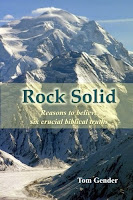Introduction
Rock Solid (paperback and GoodReads) is Tom Gender's latest addition to the library of books available to those who wish to defend the truth of Christianity. It takes a very straightforward and organized approach of defending six crucial doctrines of Christianity. He has divided the 178 pages accordingly into six chapters and includes an outline of the challenges address in the appendix.Book Introduction
Tom Gender introduces his latest work by explaining the important both both theology and apologetics to the Christian. In doing so, he establishes a necessary connection between the two: if a Christian is defending a false theology, then they are not defending a true worldview, and if a skeptic knows how to demonstrate that theology false, then they have logical reason for rejecting the worldview of the Christian. This can provide no end of doubts and stumbling blocks for unbelievers to come to Christ and Christians to consider rejecting their worldview. Gender emphasizes that apologetics should not be done in the absence of theology. To be effective, both must be practiced together.Using that as a springboard, Gender's purpose behind this book is to focus on the proper understanding of several of Christianity's most challenged and challenging core doctrines and how to defend their truth biblically, historically, scientifically and philosophically. Each doctrine will contain four parts: an explanation of the doctrine, an expansion upon its details, an engagement with common challenges to the doctrine and its details, and the practical implications of embracing the doctrine.



